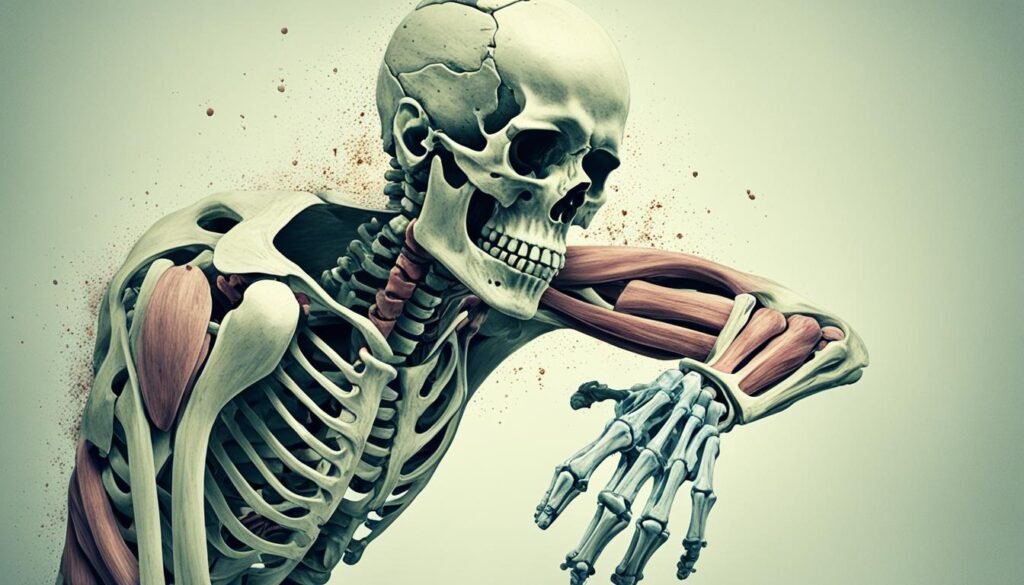Repression is when we hide away troubling emotions, memories, and thoughts. Sigmund Freud showed us that we do this to protect ourselves from guilt and anxiety. However, pushing these things down can actually harm us over time, leading to more psychological distress.
It’s important to know that repression and suppression are not the same. Suppression is what we do on purpose to avoid thinking about bad things. Unlike suppression, repression happens without us even realizing it. This difference helps us understand how our minds work and how it affects our actions and feelings.
Key Takeaways:
- Repression is the unconscious blocking of unpleasant emotions, impulses, memories, and thoughts from the conscious mind.
- Repression is often used as a psychological defense mechanism to minimize feelings of guilt and anxiety.
- Repression can lead to greater psychological distress and disruptions in emotional regulation and coping mechanisms.
- Repression is distinct from suppression, which is the conscious, deliberate attempt to forget or not think about painful information.
- Understanding the impact of repression on behavior is crucial for exploring its effects on trauma responses, social conformity, personality development, and resilience.
Understanding Repression and Its Role in Behavior
Sigmund Freud, a famous psychologist, came up with the idea of repression. It means hiding bad feelings or thoughts in our mind. These can be strange desires, fears, or past memories. We do it unknowingly, to avoid feeling guilty or anxious. Freud saw this as a major way our minds protect us.
Sigmund Freud’s Concept of Repression
To Freud, our true deep thoughts are hidden in the unconscious mind. This part of us keeps frightful or hidden memories away. It does so to shield us from getting upset. Freud called this keeping apart the unconscious and conscious the act of “repression.”
The Conscious and Unconscious Mind
Freud believed our minds have three parts. First, there’s the conscious mind, which deals with what we know right now. Then, the preconscious has things we can remember if needed. Finally, the unconscious mind keeps a secret stash of hidden thoughts and memories from us.
Freud wanted to explain how our minds work. He looked at how hiding thoughts in the unconscious affects our behavior. This includes how repression shapes how we act and think.
Repression as a Defense Mechanism
Repression is a key part of how we shield our self-image and handle our feelings. It’s all about hiding away emotions, thoughts, and memories that are too hard to deal with.
By keeping these things out of our mind, we protect how we see ourselves. We look in control and stable on the outside, even if it’s not 100% true on the inside.
Protecting the Self-Image
People using repression work hard to look good to others. They push away feelings like worry and anger. This keeps them feeling like they’re in charge and stops them from worrying about their self-worth. But, it also means they might not show their true feelings to the world.
Emotional and Cognitive Inhibition
Repression doesn’t just hide emotions. It also hides certain thoughts or past events. These could shake up how they see themselves. By stopping these things from coming up, people limit how much they know themselves and can make choices.
Distinguishing Repression from Related Concepts
Repression is a known defense tactic. But, it’s not the same as suppression and anxious defensiveness. Learning about these differences helps us understand how people deal with feelings.
Repression vs. Suppression
The key divide between repression and suppression is awareness. Repression is when you push bad thoughts away unconsciously. This is to keep a good image of yourself. On the other hand, suppression is aware. It’s choosing not to think about or recall hurting facts.
Repression vs. Anxious Defensiveness
Anxious defensiveness is about holding back emotions and using strategies to guard against threats. It’s to protect our worth and peace. While both repression and anxious defensiveness aim to protect, they differ. Repression focuses on controlling emotions and showing a good image. Anxious defensiveness is rooted in worry and feeling exposed.
the impact of repression on behavior
Emotional Regulation and Coping Mechanisms
Repression is when you lock away tough feelings and memories. This can really mess with how we deal with our emotions and the ways we learn to handle them. People who repress a lot find it hard to pick up healthy ways to cope. They might use methods that don’t help them feel better.
Maladaptive Behaviors and Psychological Distress
When you keep those bad feelings shut away, you might start doing things that hurt you more. This could be turning to drugs, hurting yourself, or having trouble with eating. Trying to deal this way can make you feel even worse. It just keeps going around in a circle. This leads to more stress and problems.
Repression and Post-Traumatic Stress Disorder (PTSD)
The connection between repression and PTSD is a major focus for experts. Repression happens when someone blocks out really bad memories. This can lead to the development of PTSD symptoms.
Traumatic Memory Processing
Trauma can scar the mind, causing unwanted memories and severe emotional pain. When someone represses these memories, their mind tries to ignore the trauma. But this blocks the natural healing process and makes PTSD more likely.
Repression and PTSD Symptomatology
Trying to repress traumatic memories can result in symptoms like intrusive thoughts, nightmares, and feeling emotionally numb. People might also have flashbacks, feeling like they’re back in the traumatic moment. This can make their distress even worse.
Not dealing with these memories can push a person to use bad ways to cope. They might try to avoid thinking about the trauma or space out mentally. But these coping methods can make PTSD worse and slow down recovery.
It’s really important to grasp how repression affects PTSD for good treatment. Therapies like talking it out or changing how we think (psychoanalysis and cognitive-behavioral therapy) are key. They help us understand our mind’s defenses and deal with traumatic memories. This can lead to healing and becoming stronger.
Health Consequences of Repressive Coping
New studies show a not-so-good link between repression and health. It’s not just about physical issues. Repressing emotions can also mess with mental health. The first part underlines how pushing feelings down can increase the chance of getting sick. This includes major troubles like chronic pain and even cancer.
Physical Health Implications
Trying to suppress bad feelings could lead to physical problems. Not dealing with hard emotions can harm our bodies. It messes with our natural balance and makes us more likely to get sick. This can show up as various physical signs of a deeper issue.

Psychological Well-being and Resilience
Repression doesn’t just hit our bodies. It also punches our mental well-being and how tough we are. Keeping tough emotions inside can stop us from learning good ways to cope. This often leads to more anxiety and sadness.
On the other hand, facing our feelings well makes us stronger. People who can do this bounce back better from hard times. They get to know themselves more and find better ways to deal with what life throws at them.
Repression in Social and Cultural Contexts
Repression is more than just our personal feelings. It’s also about the worlds we live in. For instance, places that force everyone to be the same can make people more likely to keep their feelings hidden. This is especially true in societies that don’t allow much room for different opinions.
Authoritarianism and Social Conformity
In places where rules are strict and opinions are controlled, people learn to hide their true feelings. They do this to avoid standing out or getting in trouble. This can lead to everyone looking like they agree all the time, even if they don’t really.
Personality Development and Individual Differences
Where we grow up shapes how we act and feel. If your community always expects you to look perfect and strong, you might hide your true self. This can create a culture where everyone is scared to show their feelings, leading to repression.
Therapeutic Approaches and Interventions
Psychotherapy plays a key role in helping people deal with the effects of repression. It has been heavily studied and used in therapy. Two approaches that stand out are psychoanalysis and cognitive-behavioral therapy.
Psychoanalysis and Emotional Expression
Sigmund Freud’s theories are at the heart of psychoanalysis. He said it’s crucial to make hidden feelings and desires known. This process can help individuals understand and deal with their emotions, making them healthier emotionally.
Therapists in psychoanalysis use many methods to help their patients. These include saying whatever comes to mind (free association), looking at dreams, and analyzing how patients see their therapists. The aim is to let emotions out and to understand the reasons behind unhealthy behaviors and mental struggles.
Cognitive-Behavioral Therapy and Coping Skills
Cognitive-behavioral therapy (CBT) offers a different approach. It focuses on teaching patients new ways to cope. The idea is to identify negative thoughts and actions and replace them with positive ones. This can help reduce the effects of repression and improve how we manage our emotions.
CBT helps patients find better ways to deal with tough feelings. Instead of avoiding or bottling up emotions, they learn techniques to face their feelings. This method strengthens people against mental troubles and teaches them to handle strong emotions well.

Controversies and Future Directions in Repression Research
The idea of repressed memories, especially those linked to childhood abuse, is hotly debated in psychology. Elizabeth Loftus and others have shown how easily false memories can be created. They prove that people might believe these memories although the actual events didn’t happen as they remember.
This situation makes us question the truth and trustworthiness of repressed memories. It also flags concerns that trying to help with therapy could create or change memories. Since human memory is complex and personal experiences are subjective, it’s hard to know for sure if repression is real or just a suggestion.
Progress in repression research is leading us to understand emotional memory better. It’s also shedding light on how trauma affects our thoughts and actions. Ethical and strong ways to assess and treat psychological issues are being developed.
Moreover, researchers are looking at how things like suppression, denial, and emotional control play into repression. This helps them get a broader picture of how the mind works.


